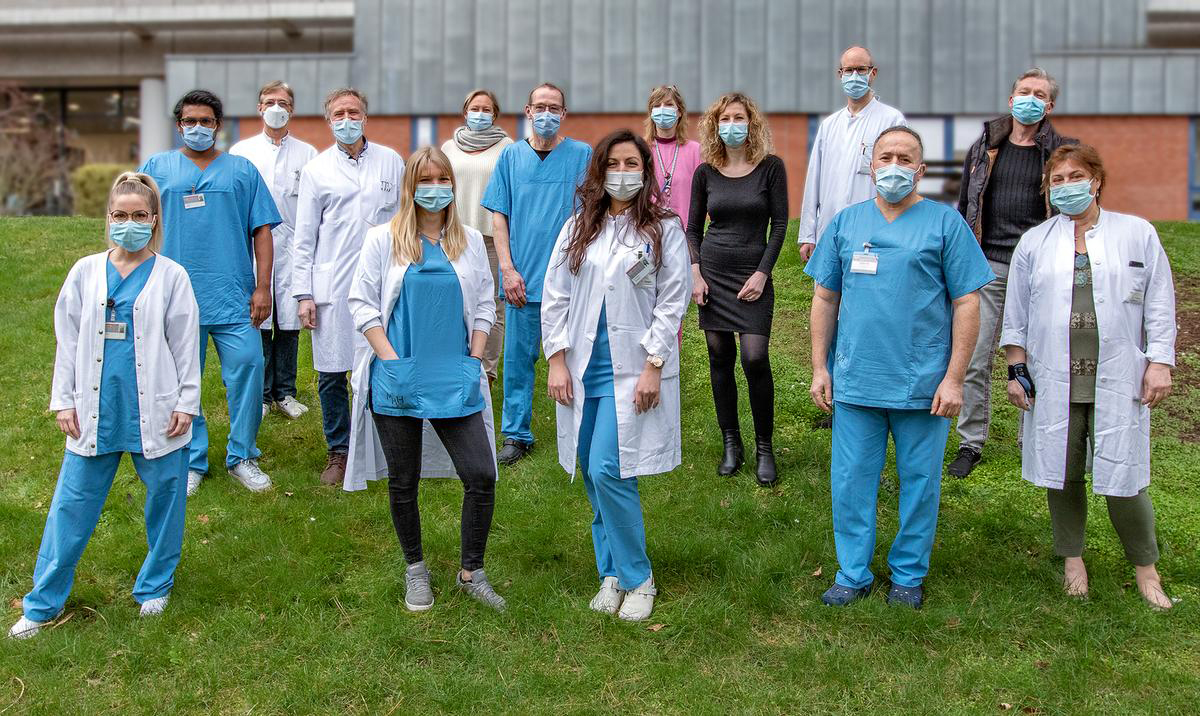Successful teamwork: MHH haematologists performed a total of 96 blood stem cell transplants in 2020 - despite corona conditions.

The large MHH team around the blood stem cell transplantation. Copyright: Karin Kaiser / MHH
Status: 11 March 2021
The transplantation of bone marrow and blood stem cells is a complicated and very stressful procedure for patients. Nevertheless, it is often the only chance for a cure. In the Department of Haematology, Haemostaseology, Oncology and Stem Cell Transplantation at Hannover Medical School (MHH), a total of 96 allogeneic stem cell transplants were performed in 2020 - more than ever before. "Allogeneic" means that the stem cells come from a donor person, i.e. a relative or an anonymous person. Clinic Director Professor Dr. Arnold Ganser is pleased about the record: "We were able to help many affected people, although the procedures surrounding the transplants were complicated by the Corona pandemic." This was made possible above all by the good teamwork of all the departments and specialists involved. In 2019, 90 stem cell transplants were performed at the clinic.
In adult patients, stem cell transplants are mainly performed for malignant diseases of the blood formation. "Mostly, these are leukaemias, i.e. blood cancers, or lymphomas, i.e. tumours in the lymphatic tissue," explains Professor Dr Matthias Eder, Vice Clinic Director. Stem cell transplantation is indicated, for example, when chemotherapy has not brought the desired success. The cells usually come from the blood, more rarely from the bone marrow of the donor.
A long process
For the transplant, the patients are first "conditioned". This means that their own bone marrow and the diseased cells are destroyed. Then - as a replacement for the destroyed bone marrow, so to speak - the donor stem cells are transferred. These then settle in the marrow cavities of the bones and begin to form new functional blood cells. "If there are no complications, the process takes about six weeks," explains Dr Gernot Beutel, senior physician at the allogeneic stem cell transplant ward.
After the transplant, the patients are extremely susceptible to infection. Rejection reactions are also possible. These are to be prevented by taking medication, sometimes for months. "In this critical phase, the patients are initially followed up weekly, later annually on an outpatient basis," says Dr. Michael Stadler, senior physician at the Outpatient Clinic for Bone Marrow and Blood Stem Cell Transplantation.
Record through teamwork
Blood stem cell transplantation is an extremely well-organised procedure. Many areas and experts work hand in hand: physicians and nurses on the ward and in the outpatient department, experts in coordination and documentation as well as experts from the Institute for Transfusion Medicine and Transplant Engineering and the Cellular Therapy Centre. The Corona pandemic has made procedures much more difficult. For example, it is no longer certain that stem cells can be taken from the previously identified donor person at exactly the right time. "It could be that the person in question has Corona or is in quarantine," explains Professor Eder. "Then we would have conditioned the patient or the patient and the urgently needed donor stem cells would not be there." To prevent such life-threatening situations, the transplants are frozen before conditioning begins and only thawed on the ward at the time of transplantation. Only when the transplant is in the clinic is the conditioning of the patient begun. "All this means a lot more organisation. But thanks to the excellent teamwork, we even managed to achieve the record last year ", notes Clinic Director Professor Ganser.